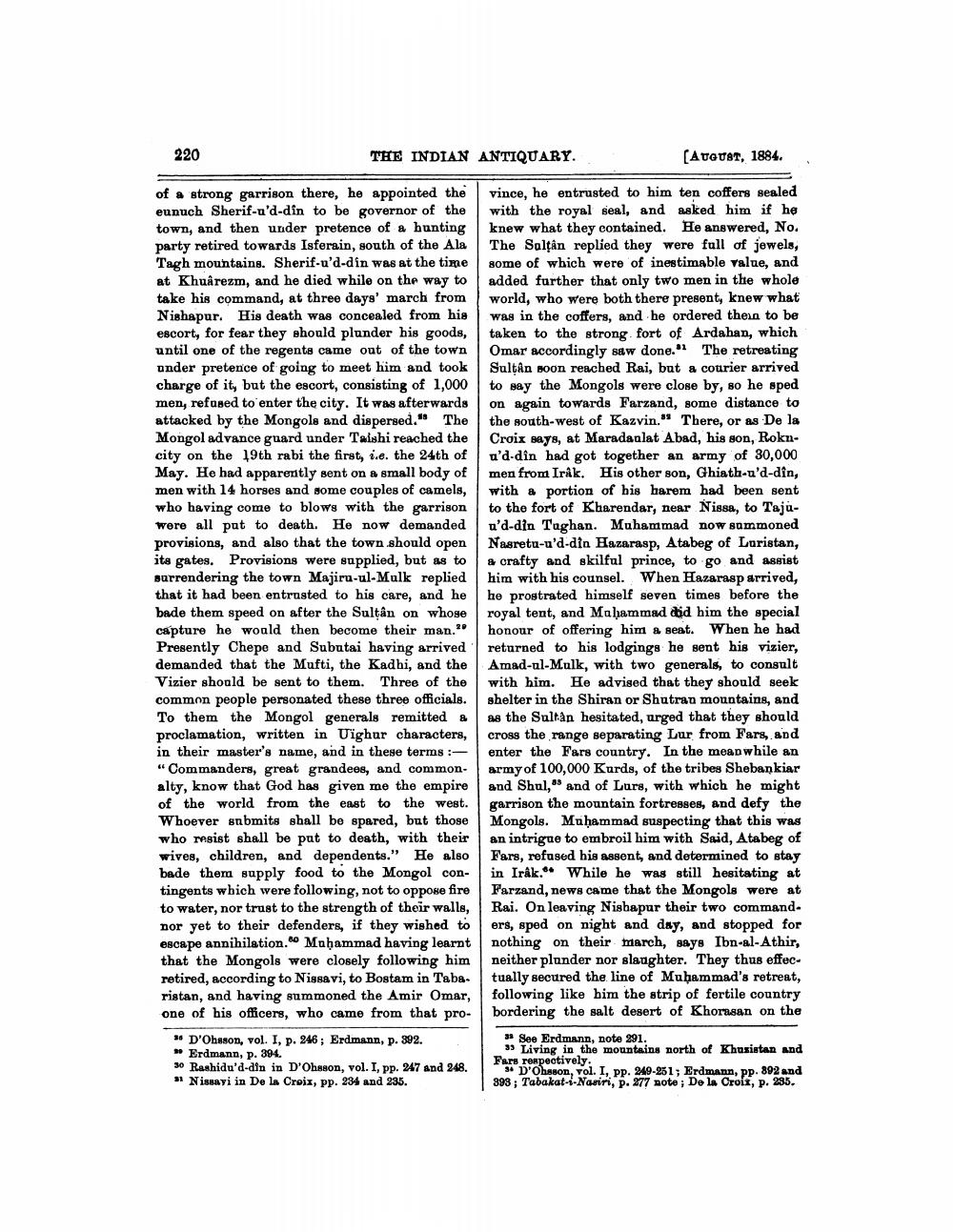________________
220
THE INDIAN ANTIQUARY.
(AUGUST, 1884.
of a strong garrison there, he appointed the eunuch Sherif-u'd-din to be governor of the town, and then under pretence of a hunting party retired towards Isferain, south of the Ala Tagh mountains. Sherif-u'd-din was at the time at Khuárezm, and he died while on the way to take his command, at three days' march from Nishapur. His death was concealed from his escort, for fear they should plunder his goods, until one of the regents came out of the town under pretence of going to meet him and took charge of it, but the escort, consisting of 1,000 men, refused to enter the city. It was afterwards attacked by the Mongols and dispersed." The Mongol advance guard under Taishi reached the city on the 19th rabi the first, i.e. the 24th of May. He had apparently sent on a small body of men with 14 horses and some couples of camels, who having come to blows with the garrison were all put to death. He now demanded provisions, and also that the town should open its gates. Provisions were supplied, but as to surrendering the town Majiru-ul-Mulk replied that it had been entrusted to his care, and he bade them speed on after the Sultan on whose capture he would then become their man." Presently Chepe and Subutai having arrived demanded that the Mufti, the Kadhi, and the Vizier should be sent to them. Three of the common people personated these three officials. To them the Mongol generals remitted proclamation, written in Uighur characters, in their master's name, and in these terms :"Commanders, great grandees, and commonalty, know that God has given me the empire of the world from the east to the west. Whoever snbmits shall be spared, but those who resist shall be put to death, with their wives, children, and dependents." He also bade them supply food to the Mongol contingents which were following, not to oppose fire to water, nor trust to the strength of their walls, nor yet to their defenders, if they wished to escape annihilation. Mohammad having learnt that the Mongols were closely following him retired, according to Nissavi, to Bostam in Tabaristan, and having summoned the Amir Omar, one of his officers, who came from that pro
vince, he entrusted to him ten coffers sealed with the royal seal, and asked him if he knew what they contained. He answered, No. The Sultan replied they were full of jewels, some of which were of inestimable value, and added further that only two men in the whole world, who were both there present, knew what was in the coffers, and he ordered them to be taken to the strong fort of Ardahan, which Omar accordingly saw done." The retreating SultAn soon reached Rai, but a courier arrived to say the Mongols were close by, so he sped on again towards Farzand, some distance to the south-west of Kazvin." There, or as De la Croix says, at Maradaulat Abad, his son, Rokna'd-din had got together an army of 30,000 men from Iråk. His other son, Ghiath-u'd-din, with a portion of his harem had been sent to the fort of Kharendar, near Nissa, to Tajua'd-din Taghan. Muhammad now summoned Nasreta-u'd-din Hazarasp, Atabeg of Luristan, & crafty and skilful prince, to go and assist him with his counsel. When Hazarasp arrived, he prostrated himself seven times before the royal tent, and Mahammad did him the special honour of offering him a seat. When he had returned to his lodgings he sent his vizier, Amad-ul-Mulk, with two generals, to consult with him. He advised that they should seek shelter in the Shiran or Shutran mountains, and as the Sultan hesitated, urged that they should cross the range separating Lur from Fars, and enter the Fars country. In the meanwhile an army of 100,000 Kurds, of the tribes Shebankiar and Shul," and of Lurs, with which he might garrison the mountain fortresses, and defy the Mongols. Muhammad suspecting that this was an intrigue to embroil him with Said, Atabeg of Fars, refused his assent, and determined to stay in Irak.. While he was still hesitating at Farzand, news came that the Mongols were at Rai. On leaving Nishapur their two commanders, sped on night and day, and stopped for nothing on their march, says Ibn-al-Athir, neither plunder nor slaughter. They thus effectually secured the line of Muhammad's retreat, following like bim the strip of fertile country bordering the salt desert of Khorasan on the
D'Ohason, vol. I, p. 246; Erdmann, p. 392. * Erdmann, p. 394. 30 Rashidu'd-din in D'Ohason, vol. I, pp. 247 and 248. » Nissavi in De la Croix, pp. 234 and 235.
* See Erdmann, note 291.
3 Living in the mountains north of Khusistan and Fars reapectively.
34 D'Ohsson, vol. I, pp. 249-251; Erdmann, pp. 892 and 898 ; Tabakat--Nasiri, p. 277 note; De la Crois, p. 285.




